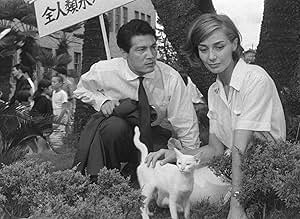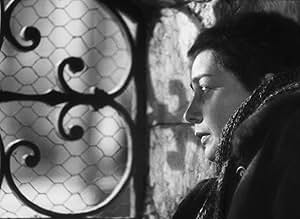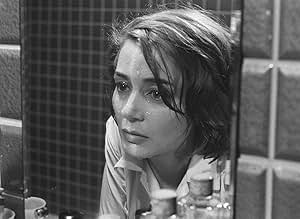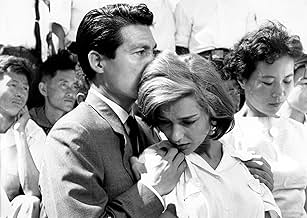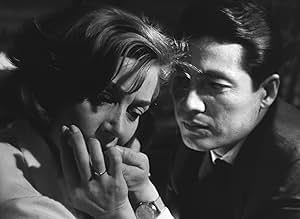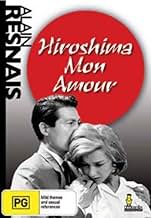IMDb रेटिंग
7.8/10
38 हज़ार
आपकी रेटिंग
अपनी भाषा में प्लॉट जोड़ेंA French actress filming an anti-war film in Hiroshima has an affair with a married Japanese architect as they share their differing perspectives on war.A French actress filming an anti-war film in Hiroshima has an affair with a married Japanese architect as they share their differing perspectives on war.A French actress filming an anti-war film in Hiroshima has an affair with a married Japanese architect as they share their differing perspectives on war.
- 1 ऑस्कर के लिए नामांकित
- 7 जीत और कुल 7 नामांकन
Emmanuelle Riva
- Elle
- (as Emmanuele Riva)
Moira Lister
- (Dubbed Emmanuelle Riva)
- (बिना क्रेडिट के)
फ़ीचर्ड समीक्षाएं
I saw this thirty or so years ago. I don't remember it moving me profoundly, but then so many things at that age routinely inject you with massive change without you knowing. Seeing it now gives me great, great appreciation for what it is. And though I have been previously exposed, it washed over me all over again.
It has a laconic pace. Usually, one leverages this for relaxation into nature. Robert Redord. Here it relaxes into a tension of a different order, a quiet insistent striving for connection, like "In the Mood for Love." In this case though, the filmmaker has turned that yearning sideways so you have three dimensions of pull.
You have the desire for romance, here presented in a way that is more engaging than usual because of its folding into the other dimensions. You have the desire to comprehend war, war defined here as the sacrifice of innocents and war as a sort of incomprehensible desire running in parallel to all the other incomprehensible desires we see, every one.
And you have the desire of a film to reach into the inner world of ourselves. Film itself is a character here, with its own desires and doubts. The three of these fold in such a way that as we spend time with them we have to fill it by pouring ourselves into the film because it pulls story from us rather than serving it in timely patter.
Its an open world, made open by providing an amazing skeleton, on which we are surprised to find our own flesh and our own wondering about next actions.
He, an architect, she an actress, both highly cinematic beings. Both in Hiroshima with folded cranes over dying souls in beds. Both, this is us now, wondering, shall we do it? Shall she stay? What will it mean? Surely that the world will not be saved, not even a little, not even that they may try. Or will they? Should they?
This is such an open framework that not only do you pour yourself into it, but other filmmakers can and do. You owe it to yourself to see "H Story." after this. Or better, before. Hah!
Ted's Evaluation -- 4 of 3: Every cineliterate person should experience this.
It has a laconic pace. Usually, one leverages this for relaxation into nature. Robert Redord. Here it relaxes into a tension of a different order, a quiet insistent striving for connection, like "In the Mood for Love." In this case though, the filmmaker has turned that yearning sideways so you have three dimensions of pull.
You have the desire for romance, here presented in a way that is more engaging than usual because of its folding into the other dimensions. You have the desire to comprehend war, war defined here as the sacrifice of innocents and war as a sort of incomprehensible desire running in parallel to all the other incomprehensible desires we see, every one.
And you have the desire of a film to reach into the inner world of ourselves. Film itself is a character here, with its own desires and doubts. The three of these fold in such a way that as we spend time with them we have to fill it by pouring ourselves into the film because it pulls story from us rather than serving it in timely patter.
Its an open world, made open by providing an amazing skeleton, on which we are surprised to find our own flesh and our own wondering about next actions.
He, an architect, she an actress, both highly cinematic beings. Both in Hiroshima with folded cranes over dying souls in beds. Both, this is us now, wondering, shall we do it? Shall she stay? What will it mean? Surely that the world will not be saved, not even a little, not even that they may try. Or will they? Should they?
This is such an open framework that not only do you pour yourself into it, but other filmmakers can and do. You owe it to yourself to see "H Story." after this. Or better, before. Hah!
Ted's Evaluation -- 4 of 3: Every cineliterate person should experience this.
This is surely one of the most impressive movies i know. It is also a very impressive portrait of a woman. Don't expect to see an ordinary love story -it is as not so much a love story as a story of a wounded person meeting a wounded city. A story about two people hurt by peace. Even though it is over more than four decennia old it feels surprisingly new. The reason for this must be the beautiful photography -starting with the very first shots of the two lovers- and the deliberate moving away from conventional script writing by Marguerite Dumas. The movie has the feel of an opera, with the music of Georges Delerue as a moving force. I thought it was enchanting, and it stayed with me for days after.
It's nearly impossible to talk about "Hiroshima, Mon Amour" in the same language I use to talk about other films. Even people used to international cinema may find themselves somewhat boggled by this visual tone poem. It's beautiful, and it leaves a distinct impression, but it does so in the way that a striking and unexpected image would, not in the way that an accessible film narrative would. Therefore, it interests without ever fully engaging.
To say that Resnais' film has something in common with silent cinema would be misleading, because sound certainly matters. But the movie definitely feels like a piece of non-verbal cinema, where sensation matters more than cognition.
A movie I probably need to see again to truly appreciate.
Grade: A
To say that Resnais' film has something in common with silent cinema would be misleading, because sound certainly matters. But the movie definitely feels like a piece of non-verbal cinema, where sensation matters more than cognition.
A movie I probably need to see again to truly appreciate.
Grade: A
Memory has persistently troubled filmmakers, this facet of consciousness by which the past overwrites the present. Where do these images come from, at what behest? More importantly, by invoking memory, how can we hope to communicate to others this past experience, which only perhaps existed once?
The woman says she saw Hiroshima, the charred asphalt and scorched metal, the matted hair coming out in tufts. We may have seen the same anonymous images of disaster, elsewhere, and think we saw. We see other people like her, like ourselves as mere spectators of a film, walk around the a-bomb museum in Hiroshima among the relics of disaster, lost in thought, impotent to reconstruct the experience from these glassed remnants of it. One of the great metaphors of memory, this museum that houses and presents fragmentary what used to be and how the spectators merely move inside it—internal observers of images.
The woman says she saw Hiroshima, but we know she didn't really experience. We know by the same images we may have seen, and which we see again in the film. We know this from our own private efforts to relive time gone. We see the objects and sounds but not having walked among them, we only know them vicariously. Can we ever get to know through cinema for that matter?
The great contribution of Resnais to cinema is firstly this, the realization that this medium is inherently equipped to inherit the problem of memory—just what is this illusory space. Inherently equipped in the same breath to fail to recapture the world as it was, like memory. Where Godard would be in thirty years, Resnais—and his friend Chris Marker—already was with his debut. He gives us here a more poignant, intelligent disclaimer of the artificiality of cinema than Godard ever did. The woman is of course an actress starring in a film—about peace we find out.
But Hiroshima is not the simple ploy of a trickster, it enters beyond.
We see in Hiroshima how the past forms that make up life as we have known it, and in which the self was forged, come into play. How these things, a past love or suffering thought to matter at the time, are only small by the distance of time. That we weren't shattered by them.
And we see how, having been, these forms will vanish again. How this present love and perhaps the suffering that will follow it, thought to matter now, will also come to pass and be forgotten. How we will perhaps try to recount these events at a future time, our reconstructions faced with the same impotence to make ourselves known or know in turn.
All that remains then, having walked the city in an effort to shape again from memory, is this moment, perhaps shared by two people on a bed. These walks taken together. Perhaps a story to tell or a film about it.
Something to meditate upon.
The woman says she saw Hiroshima, the charred asphalt and scorched metal, the matted hair coming out in tufts. We may have seen the same anonymous images of disaster, elsewhere, and think we saw. We see other people like her, like ourselves as mere spectators of a film, walk around the a-bomb museum in Hiroshima among the relics of disaster, lost in thought, impotent to reconstruct the experience from these glassed remnants of it. One of the great metaphors of memory, this museum that houses and presents fragmentary what used to be and how the spectators merely move inside it—internal observers of images.
The woman says she saw Hiroshima, but we know she didn't really experience. We know by the same images we may have seen, and which we see again in the film. We know this from our own private efforts to relive time gone. We see the objects and sounds but not having walked among them, we only know them vicariously. Can we ever get to know through cinema for that matter?
The great contribution of Resnais to cinema is firstly this, the realization that this medium is inherently equipped to inherit the problem of memory—just what is this illusory space. Inherently equipped in the same breath to fail to recapture the world as it was, like memory. Where Godard would be in thirty years, Resnais—and his friend Chris Marker—already was with his debut. He gives us here a more poignant, intelligent disclaimer of the artificiality of cinema than Godard ever did. The woman is of course an actress starring in a film—about peace we find out.
But Hiroshima is not the simple ploy of a trickster, it enters beyond.
We see in Hiroshima how the past forms that make up life as we have known it, and in which the self was forged, come into play. How these things, a past love or suffering thought to matter at the time, are only small by the distance of time. That we weren't shattered by them.
And we see how, having been, these forms will vanish again. How this present love and perhaps the suffering that will follow it, thought to matter now, will also come to pass and be forgotten. How we will perhaps try to recount these events at a future time, our reconstructions faced with the same impotence to make ourselves known or know in turn.
All that remains then, having walked the city in an effort to shape again from memory, is this moment, perhaps shared by two people on a bed. These walks taken together. Perhaps a story to tell or a film about it.
Something to meditate upon.
In my previous paper I said that À bout de souffle was an extremely complicated movie. Well, if we compare it to Resnais' Hiroshima, mon amour, it just seems to be a skilled aesthetic exercise. I think Resnais takes a further step in modern cinema intermingling influences from surrealism, modernism and the New Wave of French cinema: intimate topics, deep and changing characters, oneirism, unclear limits between reality and mind. His movie is a skilled masterpiece that really needs to be seen twice since its symbolism and action are extremely interwoven. Personally, I felt somewhat frustrated the first time I saw it. Indeed, I find that Resnais style in this film is too extreme in some ways. He twists action and mixes reality with memories in a way that makes the spectator lose his/her way once and again. On top of that, most usually action is extremely slow -quite the contrary of his colleague Godard- and takes are extremely long. Truffaut did shoot this kind of scenes, but his were also agile, attractive. Resnais is slow, exasperating, boring. We must think however that Hiroshima mon amour is a literary film, a long shot poem. The script is a literary work of art by Marguerite Duras. Indeed, dialogs are like lines in a poem, rhythmically broken, slow, as if they were declaimed instead of simply said. Resnais complements this poetry inserting strongly lyric scenes of the Japanese people and the city of Hiroshima and playing around with meaningful light, as we will see later. In my opinion, the main topic of this film is memories and how a forgotten dark past can shape our present and determine our future. Basically, the film tells the story of a woman who has gone through a painful experience in his youth: she loved a German soldier during the occupation of Nevers, her hometown in France. This caused despise from her family and her community. This is a story that she has not told ever before. But an affair with a Japanese man while she shoots a film in Hiroshima will wake up her memories. The Japanese man recalls her of her first love; let us remember for instance, when she remembers the German man hand when she sees the Japanese's -both of them have a similar hair style and color. At some point in the film, the Japanese will grow more interested in her life in Nevers -he thinks the key to win her love is there- and this will unleash harsh flashbacks in the French woman's memories. She has never told anyone: as she talks out, articulates her memories -while they are at the bar- she will experience very strong feelings. We cannot differentiate what she was feeling at the moment of the story or what she is feeling now, what is a fact and what is a memory. I find very interesting the scene in which they sit together at the bar: at some point she takes the Japanese man for her old love. She begins talking to him as if he was so. Her memories take her over and she talks what she feels, what she remembers. Light effects are magical: she is drowned in brightness while the Japanese man stays in the dark. She talks and talks and Resnais inserts the necessary flashback images. The Japanese at that moment acts as the voice of her own memory: he asks her once and again. Until a point when she suffers so dramatically that the Japanese man, the real one, slaps her in her face to wake her up. Now we find a sharp kind of awakening. While she talked everything was silent. Now, everything sound as what it is: a bar with people chattering and frogs in the dark stream outside. There are four main elements in the film that spin around the life of the French girl, whose name we do not know. Two cities: Nevers and Hiroshima. And two men: the German soldier and the Japanese man. There is a whole system of connections between these four elements in the center of which is her. Resnais uses the powerful image of Hiroshima, the sadness of the place and grief of the people to identify the sadness and grief of the Frecn girl at Nevers. On the other side, the Japanese man reminds her of the German soldier. There is not an exact parallelism between the two cities or the two men, but connections can be made. We must remember the images of the streets in Hiroshima and the images of Nevers -la Place de la République, the churches-, flowing at the same time. The beautiful but empty Loire, the dead fields of Hiroshima. Although we can see some parallelism between the two cities, Resnais ends up the film with a scene in which this relationship seems to be much stronger. 'Toi, ton nom est Hiroshima. - Et toi, ton nom est Nevers, en France'. However, I cannot figure out what is the exact relationship between the two cities: maybe a comparison between grief in the memory and actual grief in the present day. Whatever way it might be, Resnais leaves for us a cryptic, dark ending that we would have to figure out the best we can depending on the elements he has given us in the film.
क्या आपको पता है
- ट्रिवियाThis film pioneered the use of jump cutting to and from a flashback, and of very brief flashbacks to suggest obtrusive memories.
- गूफ़When Elle leaves the hotel to go the set, she is wearing a nurse's uniform with a headscarf and carrying a black handbag. When Lui meets her on the set, she is now wearing a skirt and blouse and still has the headscarf. When they leave the set, the headscarf is left behind. When they get to Lui's house, she now has a white jacket.
- कनेक्शनEdited into Histoire(s) du cinéma: Le contrôle de l'univers (1999)
टॉप पसंद
रेटिंग देने के लिए साइन-इन करें और वैयक्तिकृत सुझावों के लिए वॉचलिस्ट करें
- How long is Hiroshima Mon Amour?Alexa द्वारा संचालित
विवरण
- रिलीज़ की तारीख़
- कंट्री ऑफ़ ओरिजिन
- भाषाएं
- इस रूप में भी जाना जाता है
- Hiroshima, My Love
- फ़िल्माने की जगहें
- Nevers, Nièvre, फ़्रांस(street scenes, river banks)
- उत्पादन कंपनियां
- IMDbPro पर और कंपनी क्रेडिट देखें
बॉक्स ऑफ़िस
- US और कनाडा में सकल
- $96,439
- US और कनाडा में पहले सप्ताह में कुल कमाई
- $18,494
- 19 अक्टू॰ 2014
- दुनिया भर में सकल
- $1,39,947
- चलने की अवधि
- 1 घं 30 मि(90 min)
- रंग
- ध्वनि मिश्रण
- पक्ष अनुपात
- 1.37 : 1
इस पेज में योगदान दें
किसी बदलाव का सुझाव दें या अनुपलब्ध कॉन्टेंट जोड़ें



